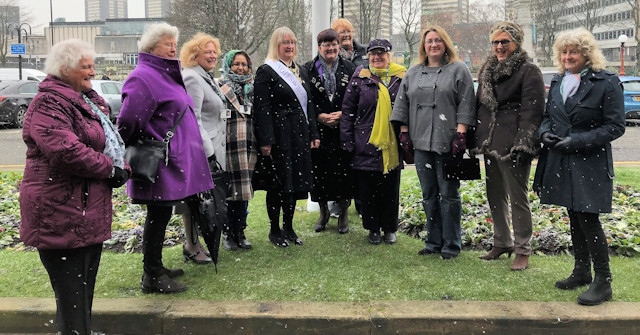Rochdale celebrates 100 years of women voting
Date published: 06 February 2018

Mayoress Christine Duckworth with local councillors
A suffragette flag celebrating 100 years of women voting was raised outside Rochdale Town Hall on Tuesday (6 February).
With the passing of the Representation of the People Act in 1918, the suffragettes were successful in gaining some women aged 30 and over the right to vote – only 40% of women were initially granted the vote. A decade later in 1928, the suffragettes were successful in granting working class women and all women under the age of 30 the right to vote, as well as the right to vote for all men over 21.
As the Mayoress Christine Duckworth, raised the flag, she gave thanks to the suffragettes saying: “It is important to commemorate this occasion, so we can remember our past and the sacrifices that those ladies made.
“These women came from all walks of life, so it was not just the middle classes, it was the working-class women as well who stood up for their rights and broke the stigma of them being uneducated.
"If we did not have the suffragettes doing what they did, then we would never have got the vote and privileges that we have today, and I think we need to remember today how fortunate we are.
“We have raised this flag to remember the importance of them as not only women got the vote, but men got their vote too and people forget that.
“There are elements in our society and in the world as a whole that still suggest we, as women, are unequal in some ways, but men and women should be viewed more as being in partnership; men are admittingly better at doing some things - I need a man on hand to help me raise this flag – but we must complement each other and take on roles that we are each good at in an individual way so we can work together.
“This is important to Rochdale because there were many people from Rochdale who were in the suffragette movement and apparently there was once a meeting at 2 Baillie Street.
“I just want to say thank you to the suffragettes for being brave, strong and courageous because without their determination and methods (which not all I agree with) things would not have been as they are today.”

The Mayor and Mayoress before raising the suffragette flag to mark 100 years of women voting
In the UK, green, white and purple were the colours of the Women's Social and Political Union, led by Emmeline Pankhurst, with purple symbolising dignity, white purity and green hope. These colours were recognised through people’s clothing at the Town Hall as some councillors wore purple dresses and green scarves, as well as ‘Votes for Women’ badges, green and purple hat pins and brooches all representing the suffragette group.
Councillor Janet Emsley wore her ‘faith, hope and charity’ brooch, as well as a green ring and a purple ring, which are believed to have represented the secret code of the suffragettes; they would wear these as an indication to other women that they were part of the same group.
Councillor Emsley is inspired by Annie Kenney, a suffragette from Oldham, who in her book ‘Memories of a Militant’ described the proposals to give women the vote: “In 1917 the question of granting the vote to women was discussed in Parliament. It was admitted by friend and foe that British women had played and were playing a unique part in the war… There was great rejoicing among all sections of women. What a relief to think that once peace was declared abroad peace on a modest scale would be declared at home. The agitation was at last drawing to a close…
“On February 6th, 1918, Royal assent was given to the ‘Representation of the People Act.’ Women were voters. And so my Suffrage pilgrimage was ended… I left the Movement, financially, as I joined it, penniless. Though I had no money I had reaped a rich harvest of joy, laughter, romance, companionship, and experience that no money can buy.”
Councillor Emsley is also inspired by suffragette Isabella Ford, quoting her from March 1918: “It is indeed wonderful when one wakes up in the morning to remember that now, at last, one is considered to be a real, complete human being!
“After thirty years of endeavour to make men understand they were only half the world… the price we have paid for our enfranchisement is too heavy, some of us find, to allow us to rejoice in the light-hearted, happy fashion we used to picture in old days, but we are filled with a deep and earnest thankfulness.”
Councillor Wendy Cocks was also in attendance, she said: “As an Australian I did not want to let this day go by as in Australia we always had the privilege of equal rights and votes.
“The Pankhursts are said to be influenced by leading women from Rochdale – Enid Stacey, the late wife of the Vicar at Calderbrook, Priscilla Bright McLaren and Margaret Bright Lucas - so this is a great way to also celebrate the women of Rochdale who gained this universal right.
“We are here today to celebrate all that women have done before but to also encourage more women for the future.”
Do you have a story for us?
Let us know by emailing news@rochdaleonline.co.uk
All contact will be treated in confidence.
Most Viewed News Stories
To contact the Rochdale Online news desk, email news@rochdaleonline.co.uk or visit our news submission page.
To get the latest news on your desktop or mobile, follow Rochdale Online on Twitter and Facebook.

